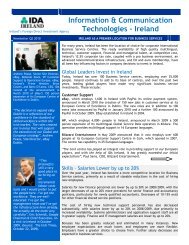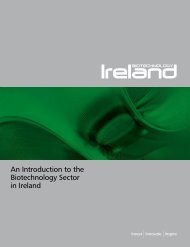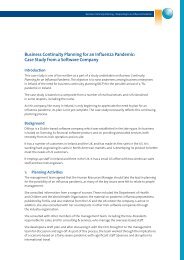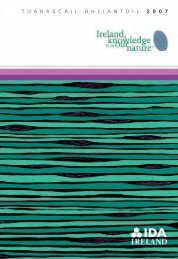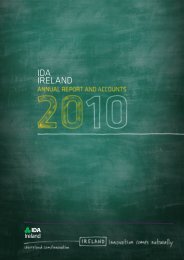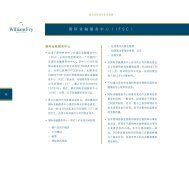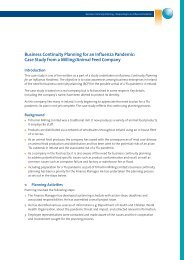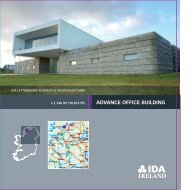Creativity - IDA Ireland
Creativity - IDA Ireland
Creativity - IDA Ireland
You also want an ePaper? Increase the reach of your titles
YUMPU automatically turns print PDFs into web optimized ePapers that Google loves.
» IINDUSTRY FOCUS<br />
‘This is a real coup<br />
for <strong>Ireland</strong>, to be<br />
awarded the honour<br />
of hosting European<br />
City of Science in<br />
2012, which is a<br />
hugely competitive<br />
award process’<br />
The first turning point was the 1996–<br />
1998 period, according to O’Neill. He had<br />
only foreseen himself staying in <strong>Ireland</strong><br />
for a few years, but then the tide turned,<br />
thanks largely to European Union<br />
grants.<br />
“You have to raise money to fund the<br />
research, and in those days there was no<br />
money coming from the Government.<br />
So, while accessing European money<br />
was very bureaucratic and onerous, we<br />
managed to obtain a few large grants,<br />
and that made all the difference. I said to<br />
myself, ‘hang on a minute, I’m going to<br />
stay now because I can really make a go<br />
of it here’.<br />
With no shortage of international job<br />
offers, O’Neill admits it was somewhat of<br />
a gamble and, indeed, he did consider<br />
leaving <strong>Ireland</strong> again in 1999. He had<br />
gone to the US on a sabbatical to a large<br />
company called Millenium, and it<br />
wanted him to stay on.<br />
“In the late Nineties it was the real<br />
flash company in biotechnology, one of<br />
the really prominent players.”<br />
GAME CHANGER<br />
After much soul-searching, O’Neill opted<br />
to stay in <strong>Ireland</strong>, and then came the big<br />
game changer, he says. “The big event, of<br />
course, was the establishment of Science<br />
Foundation <strong>Ireland</strong> (SFI) in 2000.”<br />
The Irish Government had realised by<br />
the late Nineties that it was time to fund<br />
scientific research, and commissioned a<br />
major study into the sector. The result<br />
was the establishment of the Technology<br />
Foresight Fund, with an allocated budget<br />
at the time of €646m. SFI was established<br />
in 2000 to administer the fund.<br />
“It made all the difference. Suddenly<br />
there was money and the country began<br />
to invest in science,” says O’Neill. “And<br />
you need only look at the metrics. In certain<br />
areas we’re now competitive internationally,<br />
and immunology is the big<br />
one that we’re involved in. It is staggering<br />
what we have achieved there. In the<br />
space of 10 years we went from nothing<br />
to third in the world.<br />
“The key metric in our game is what’s<br />
called citations. So if you make a discovery,<br />
how do you know it’s important?<br />
Someone mentions it, someone cites you<br />
in their work. Our average citation per<br />
paper in the 10-year period went up<br />
hugely and in 2009 we were ranked third<br />
behind the US and Switzerland, so that<br />
was a great achievement.<br />
“Itwentfromaverylowbasetoareally<br />
big, competitive one – and that<br />
means things like discoveries. I’ve always<br />
said the job of the scientist is really<br />
twofold, it’s to make new discoveries and<br />
the kind of discoveries you want are the<br />
ones that are going to shake the world.<br />
Out of <strong>Ireland</strong> in the past 10 years you<br />
would have had several of those. The second<br />
thing you want is some kind of commercial<br />
aspect that will promote<br />
commercial development.”<br />
He recalls speaking at an SFI event<br />
several years into its establishment.<br />
“I was asked to say a few words on<br />
how we would know if SFI had been successful.<br />
I said I hoped that within a 10–15<br />
year period there would have been<br />
earthshaking discoveries made in <strong>Ireland</strong>,<br />
and secondly there would be an indigenous<br />
biotech sector. They were the<br />
two things that I proposed as evidence of<br />
success, and I’m delighted to say both<br />
are happening.”<br />
Not that it’s not a challenge, admits<br />
O’Neill. “This is a long-game sector.<br />
When you look at the financial side of it,<br />
a lot of people don’t like funding science<br />
because it’s too long, there’s no immediate<br />
reward. Plus, it’s risky because you’re<br />
trying to discover brand new things.<br />
You’re trying to create brand new knowledge,<br />
so it’s difficult, people have to have<br />
a lot of patience. One of the challenges<br />
we will face now is sustaining this<br />
progress in an economic downturn.”<br />
This is why the SFI and the continuing<br />
support of government is so vital,<br />
stresses O’Neill. “I believe the job of government<br />
is to fund the risky basic research,<br />
because venture capital won’t.<br />
However, then you must have a system<br />
through which that can be commercialised<br />
and that’s not the job for government.<br />
That’s a job for the private sector<br />
to take on and that’s the way it should<br />
flow really. If you don’t have the latter,<br />
then that key part of the chain is missing<br />
and that government investment is not<br />
fully realised.<br />
“I know there are economic challenges,<br />
but this is the one time they need<br />
to be brave, given the level of investment<br />
to date. Science is a long game and you<br />
need perseverance, you need commitment<br />
and you need doggedness, both day<br />
to day in your experiments – because<br />
they’re always failing – and then with<br />
regard to the long-term output.<br />
THE IRISH SCIENTIST<br />
O’Neill believes there is something in the<br />
Irish character that is particularly suited<br />
to scientific pursuits. “It is interesting<br />
that <strong>Ireland</strong> internationally is more<br />
known for the arts, but the truth is Irish<br />
science has always been strong right<br />
through the 19th century. One of the reasons<br />
we don’t hear about these scientific<br />
Irish heroes is partly because someone<br />
else wrote the history, we didn’t write it!<br />
Once you chip into it, you see there’s<br />
always been a great interest in science in<br />
<strong>Ireland</strong>.<br />
“Another trait the Irish would have is<br />
to do with networking, we’re very good<br />
at that and science is a hugely collaborative<br />
business,” continues O’Neill. “All of<br />
my successes, whatever they have been,<br />
have been very collaborative. Our major<br />
paper on diabetes last year, for example,<br />
had seven labs involved, collaborating<br />
from all over the world. So, networking<br />
is something we’re very good at.”<br />
He also points to the creativity of the<br />
Irish, something not always associated<br />
with science, but vital too, according to<br />
O’Neill. “That creative trait the Irish<br />
have lends itself to scientific activity as<br />
well, because where does an idea come<br />
from? It’s no different from the arts. New<br />
ideas crop up and it can be a subconscious<br />
process.”<br />
16 INNOVATION IRELAND REVIEW Issue 2 Spring/Summer 2011



